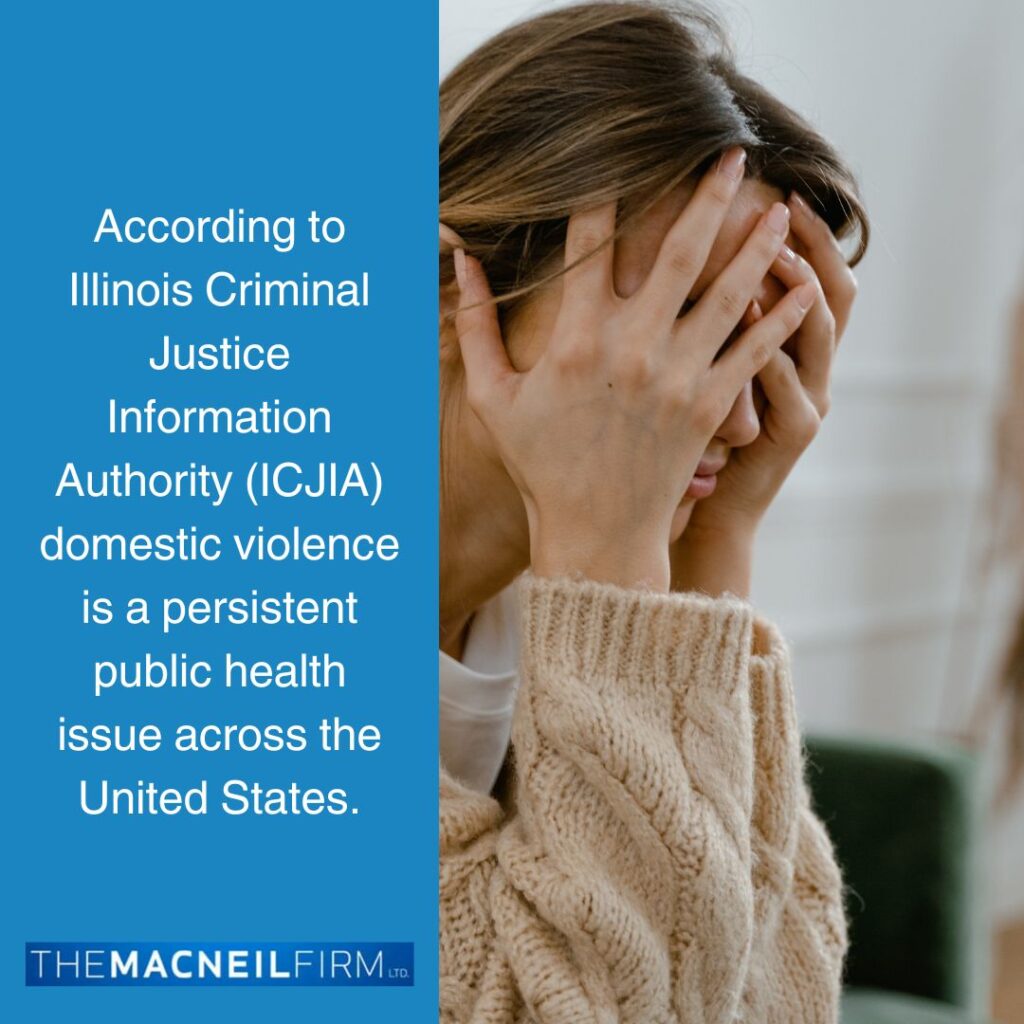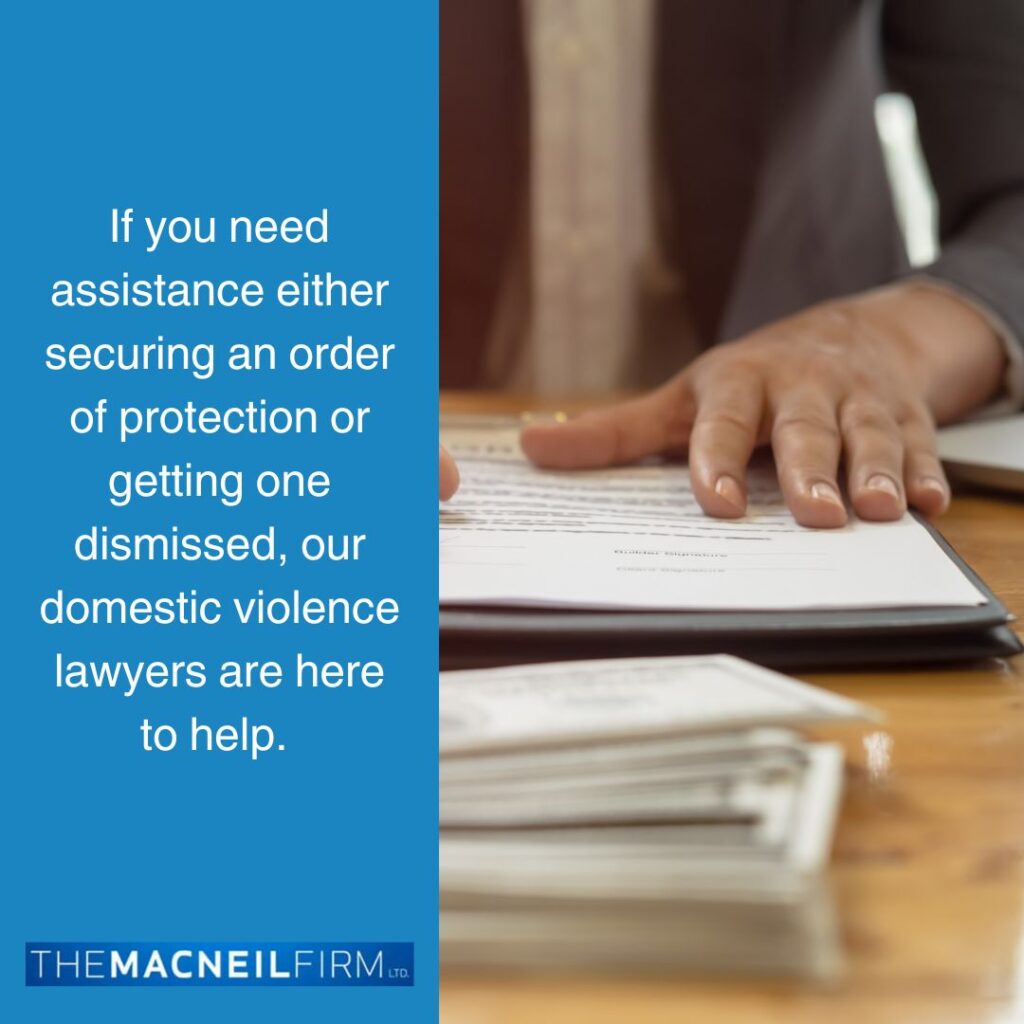According to Illinois Criminal Justice Information Authority (ICJIA) domestic violence is a persistent public health issue across the United States. The Centers for Disease Control estimates approximately 36 percent of women and 34 percent of men across the country have been harmed by an intimate partner in their lifetime. If you need domestic violence lawyers to help you, The MacNeil Firm is here. Our family of lawyers have the experience and compassion to protect you and make sure you are safe and secure moving forward.
In Illinois, estimates about domestic violence are slightly higher for women (42 percent) and lower for men (26 percent). When responding to a domestic violence call, the police will almost always arrest the male and consider the female to be the victim. However, it is not uncommon for the complaining witness in these cases to be the aggressor and the person who has been charged to have only defended themselves, which is protected under the law. In order to avoid a domestic violence conviction, the facts will have to support the self-defense argument.
What happens when a domestic violence charge is brought?
In Illinois, every domestic violence incident must be followed by a 72-hour cooling-off period, which means that no contact can be had between the parties during those 72 hours. The alleged victim can also obtain an order of protection or restraining order, which is a separate order prohibiting the defendant from making contact with them or going to a certain place for a specified period of time. Some judges make it a condition of the bail bond to have no contact with the complaining witness.
These orders are designed to protect a complaining witness and the alleged victim. In these cases, it is the alleged victim who holds the power. If you need assistance either securing an order of protection or getting one dismissed, our domestic violence lawyers are here to help.
It is an important step for the prosecutor to determine who was the aggressor in a domestic violence incident. Initially, it is a judgment call by the police. The police will also use evidence at the scene to help them make a decision, such as the presence of scratches or bruises, witness statements, weapons, and other forms of physical evidence.
A domestic violence case
These types of cases can go to trial and it is important to have a domestic violence lawyer on your side to defend you and protect your interests. In a regular criminal trial, a defendant doesn’t have to prove anything. They can just sit there while the state carries the burden of proving them guilty beyond a reasonable doubt.
However, when asserting an affirmative defense such as self-defense in a domestic violence case, the burden shifts to the defendant to prove by preponderance of the evidence that they were justified in using the amount of force used in defending themselves. The defendant would have to be prepared to testify, but self-defense is definitely a viable defense in a domestic battery case.
Sometimes the person who made the allegation may want to recant that allegation or no longer press charges against a defendant who has already been taken into custody. When this is the case, they report this to the prosecutor, who at that point in the case would hold all of the power. The prosecutor would have the choice of pursuing the case regardless of the fact that the allegation has been recanted, or dismissing the case on the basis of the allegation having been recanted. If the prosecutor thinks they have a strong enough case to proceed without the complaining witness, then they might choose to do so.
Another thing that can happen is that the case may be dismissed. If a prosecutor does not believe that they have a sufficient amount of evidence to prove their case, then they might dismiss it. For example, if the complaining witness in a domestic violence case is unwilling to testify or is otherwise uncooperative, then the prosecutor would have to decide whether or not they think they can prove the case without that witness. Or, if your domestic violence lawyers have a strong affirmative defense, the prosecution may not want to move forward with it. Ultimately, a prosecutor’s decision to pursue or dismiss a case will be determined by the strength or weakness of the evidence at their disposal.
The domestic violence lawyers at The MacNeil Firm are here to help you
Our domestic violence lawyers will make sure to use all the evidence at our disposal to mount a strong defense for you. If a prior criminal charge is an enhancing element to the current charge, we will usually ask for a bifurcated trial. That is a trial on the new substantive matter. Every case is supposed to succeed or fail based on its own facts and circumstances, so we will make sure to evaluate all the evidence and facts at our disposal to protect you and your rights. Contact The MacNeil Firm today for a free consultation with our domestic violence lawyers.



